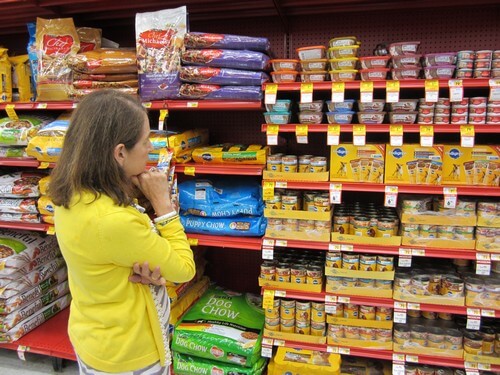An Insider’s Guide to Finding Superior Dog Food Brands
DogFoodAdvisor is reader supported See how
Dog Food Advisor is 100% impartial and is never paid to promote any brand. But if you buy using links on this page, we may earn a referral fee.
These days, there are lots of dog foods on the market. So, finding a good one can be overwhelming.
After all, on The Dog Food Advisor website alone, there are now:
- Over 950 dog food reviews
- Hundreds of product lines
- More than 4,100 recipes
So, how can you find a good brand? Here are 9 tips to help you find a superior food for your dog.
Tip #1
Check the Label
Pet food labels are loaded with lots of valuable information. Yet they can also be difficult to read. So, save yourself a lot of time and effort and…
Favor dog food brands that include multiple product lines with higher ratings.
That’s because lower rated recipes are more likely to contain:
- Less meat
- More by-products
- Controversial preservatives
- Anonymous meat ingredients
Tip #2:
Consider the Company
Many dog owners tend to distrust larger pet food companies. They mistakenly believe smaller brands are more likely to make better and safer products.
However, the facts tell a different story.
Consider this: 93% of all pet foods sold in the U.S. are produced by just 3 companies — Big Heart, Mars and Purina.1
Yet 73 of the 88 recall events documented on this website during a recent 5-year period2 are linked to products of smaller brands.3
In other words…
Even though smaller companies account for just 7% of the pet food and treats sold — they’re responsible for an eye-popping 83% of the recalls.
In addition, after conducting hundreds of interviews, it’s become apparent that…
A significant number of dog foods are not likely to meet the claims of nutritional adequacy printed on their labels.
That’s because many smaller companies have willingly admitted to us that they make no effort to verify the nutrient content or the safety of the foods they sell.
And there’s no law requiring any pet food company to do so, either.
The truth is, the smaller the brand, the less likely the company has the financial ability to perform all the steps needed to ensure the quality of its products.
So, although there are always exceptions, it’s important to keep in mind that larger companies are far more likely to:
- Employ real food scientists, animal nutritionists and other veterinary professionals to design their products
- Test raw materials for impurities and nutrient content
- Conduct regular safety and quality control procedures
- Own and operate their own manufacturing facilities
- Verify finished goods before they are shipped
- Maintain in-house testing laboratories
So, what should you do? Are dog foods made by larger companies better?
No, larger companies may or may not be better. However…
The smaller the dog food brand, the more critical it is for you to look beyond its label.
Tip #3
Identify the Manufacturer
Most dog owners assume their pet food company actually makes the products they sell.
However, today, many companies use third-party co-packers to manufacture some — or all — of their foods.
Yet others make their own.
In any case, whether or not a company makes its own dog food is neither good or bad. What’s more important is to…
Know the identity of the manufacturer of any brand you feed your pet.
Otherwise you’ll never be able to track its recall history or judge the safety of its products.
Tip #4
Question Product Design
What may surprise you is that there’s no legal requirement that a pet food be formulated by an animal nutritionist or any other veterinary professional.
In fact, over the years, we’ve uncovered a shocking number of dog foods that have been designed by amateurs.
So, to ensure the nutritional health of your pet, you should…
Contact each brand you’re considering and determine who actually designs its products.
By the way, just knowing who formulates a product is not enough. You’ll also want to know what qualifies that person to do so.
Tip #5
Confirm Nutrient Testing
It’s also important to know how the company can be certain each formulation is nutritionally complete and balanced.
And how often nutritional content testing is actually performed.
Does the company conduct laboratory analysis? Or do they run feeding trials?
Surprisingly, we have found many (mostly smaller) companies that never do any testing at all. That’s why it’s so important to…
Find out what a company does to test each product to be sure it actually meets AAFCO nutritional guidelines.
Tip #6
Investigate Ingredient Sources
No dog food can ever be magically better than the ingredients that were used to make it. Yet labels reveal little about the quality of the raw materials actually used to make the food.
Some ingredients are purchased from commodity brokers on the open market — from the cheapest bidder. Others can come from countries known to have inferior food quality standards.
However, superior companies tend to source their ingredients only from established local or regional suppliers they do business with on a recurring basis.
What’s more, Federal law does not currently require any pet food company to disclose country of origin — or any other sourcing information — on its label.
That’s why it’s so important to…
Know the source of all ingredients that are used to make any dog food you buy. Avoid brands that will not share this information with you.
By the way, imported ingredients aren’t necessarily bad. In fact, many can be of exceptional quality. For example, some vitamin and mineral supplements are pharmaceutical grade and can actually be superior to those sourced from the U.S. or Canada.
Tip #7
Demand Transparency
Some pet food companies work hard to conceal critical information about their products.
For example, we’ve actually stumbled upon a number of companies that attempt to create an artificial sense of customer support by using voice mail to take messages. Yet no one ever returns the calls.
Some brands don’t even maintain a product website.
And others resist being questioned by independent websites like The Dog Food Advisor.
These companies make it difficult (or impossible) for us to get important answers — while blaming their own unwillingness to cooperate on the fact we are not veterinarians.
Think about it. Are there any questions presented in this article that would require the knowledge of a veterinarian to answer?
Obviously, hostile or defensive companies like these are the ones that most likely have something to hide — and should not be trusted.
For all these reasons…
Never buy any dog food made by any company that is not transparent about its products or its manufacturing practices.
After all, you have a right to know.
Tip #8
Verify Quality Control
At the time of purchase, all pet foods are at risk for containing:
- Disease-causing pathogens (Salmonella, Listeria)
- Mold toxins (aflatoxin, vomitoxin)
- Environmental pollutants
- Unsafe nutrient levels
And although many pathogens can be killed (pasteurized) during cooking, deadly toxins can remain in the food throughout the manufacturing process.
What’s worse, re-contamination can occur anytime living germs from uncooked food accidentally come in contact with a finished food product.
That’s why you must…
Never buy a pet food from any company that ships finished goods before obtaining negative test results for any form of contamination.
Some companies are more diligent about this safety measure than others. A few test every batch while others test only randomly. And yet some never test anything at all.
In any case, even for us, it can be extremely difficult to determine just how carefully any brand administers its own quality control program.
Tip #9
Study the Recall History
Dog food recalls can provide some valuable clues about a brand’s manufacturing habits.
Pet owners tend to misunderstand and overreact to dog food recalls. And they’re inclined to overvalue the real significance of these events whenever they occur.
They forget that when it comes to any process involving human beings, errors are inevitable. Accidents are going to happen.
And that’s what makes dog food recalls so unpredictable. In fact, trying to forecast any pet (or human) food recall has proved to be impossible.
Just the same, even though no pet food company can completely prevent a recall, it can control how it responds to such an event when it does occur.
Unfortunately, while some companies work hard to prevent a recall, others work even harder at covering them up.
For example, some misguided brands have been known to conduct silent recalls — informing only their distributors about an event. And not the public.
Or they withhold the news about a recall and only release that information at the very end of the business week — just so they won’t have to deal with consumer questions.
Avoid buying dog food made by any brand that makes any attempt to hide recall events from the public when they occur.
Remember, most recalls typically involve only a limited number of product runs and batches. Just because a particular recipe has been recalled doesn’t mean the entire brand is defective.
So, please don’t make the same mistake made by so many other well-meaning pet owners. Don’t overreact and exclude a quality food just because of a few isolated events.
In the end, your dog could be missing out on some of the very best canine diets out there.
The Bottom Line
Of course, no system can possibly guarantee your dog’s food will never be recalled — or that your pet will approve of your choice.
However, any time you find a product that meets the majority of these guidelines, you can feel confident you’re likely to have found a superior dog food brand.
Final word
The Dog Food Advisor does not accept money, gifts, samples or other incentives in exchange for special consideration in preparing our reviews.
However, we do receive a referral fee from online retailers (like Chewy or Amazon) and from sellers of perishable pet food when readers click over to their websites from ours. This helps cover the cost of operation of our free blog. Thanks for your support.
For more information, please visit our Disclaimer and Disclosure page.




